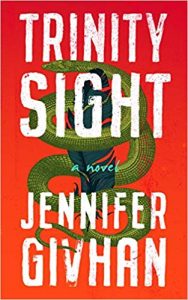Katharine Coldiron Reviews Trinity Sight by Jennifer Givhan
 Trinity Sight, Jennifer Givhan (Blackstone 978-1-53855-672-6, $25.99, 288pp, hc) October 2019.
Trinity Sight, Jennifer Givhan (Blackstone 978-1-53855-672-6, $25.99, 288pp, hc) October 2019.
There’s a lot to love about Trinity Sight, a dense debut novel packed with Native stories and myths, conceived and plotted as carefully as a nationwide conference, full of organic stakes and interesting characters. There are also significant imperfections: an author who gets too far ahead of her audience sometimes, a narrator whose stubborn streak makes her unsympathetic, and an iffy conclusion. Overall, the novel adds a lot to both apocalyptic and Native genre literature, but its richly layered quality may tire and turn off readers before the book really gets going.
Calliope, a Southwestern anthropologist with a six-year-old son and twins on the way, somehow crosses a split in the world and must find her way back. New Mexico as she knows it has evaporated, and instead she’s in the world of her ancestors: cities and people have mostly vanished, but magic and monsters flourish. After forming a band of survivors with a neighbor girl named Eunjoo, a tough young woman named Amy, and a few others, Calliope seeks her husband and son in all the wrong places. She meets a guide, Chance Guardian, who understands that returning to the reservation where his own family waits is the best way to stay safe in this weird new/old universe. Calliope resists him and his knowledge with enormous tenacity. At the book’s climax, Calliope births her twins on the reservation, and the book spends its denouement clearing up conflicts, with middling satisfaction.
Though it’s mostly written in a contemporary style, Trinity Sight grounds itself in oral storytelling. Multiple Native folk tales appear in its pages, none of which were familiar to this (white) reviewer, all of which fascinate. “The white man’s bible is only one end-of-the-world myth,” Chance reminds us. The myths on which this book operates belong to the Zuni, and the stories often unspool just beyond the reader’s comprehension. Givhan is not interested in explaining these stories, merely in passing them along. Sometimes the reader must read and leave behind a tale without fully understanding its relationship to the events of the novel.
Calliope knows some of these stories, but not all of them, and she believes none of them. The book’s central conflict lies between Calliope’s hardheaded scientific approach to this new world and Chance’s looser, more mystical view, based on his observations and the traditional wisdom of his people. Structuring the book around this conflict is a smart move in the abstract, but in practice it makes Calliope seem like an idiot. She repeatedly refuses to believe what she sees with her own eyes, because what she sees doesn’t make scientific sense. She condescendingly ignores the prescient advice Eunjoo doles out based on visions and a relationship to the trickster god Coyote. She insists that her family must have evacuated from their home and traveled to her aunt’s house, rather than accepting that they, like nearly everyone else, have disappeared from the world she now inhabits.
A heroine who makes mistakes is one thing; a heroine who repeatedly hurts herself and others due to sheer bullheadedness is another, and it’s a tiresome aspect of the novel. It takes hundreds of pages for Calliope to see the light, by which point it seems impossible that her companions wouldn’t have given up on her. However, her regret, once she realizes that Chance and his people are right, is real:
Miracles happen every day, her mother had said, if you know where to look, if you know how to look… Through the kaleidoscope of your heart. Calliope wished she would have told her mother what a beautiful thing that was to say, what a relevant piece of poetry, instead of bristling, arguing back in academic language she knew her mother couldn’t understand. What a petty child she’d been, thinking herself so high and intellectual, a crab who’d escaped the bucket – only to find herself in the fisherman’s mouth.
The book’s final third goes in unexpected directions. After giving birth, Calliope remains on the Zuni reservation for six more months, building a new and very different life. Though she never loses her urge to find her husband and son, it seems as if she’s moved on, changed herself to fit the challenges and rewards of the myth she now lives in. The conclusion of the novel takes her back where she came from, though, having sacrificed very little, able to take her place in the “normal,” non-mythological world. It’s a safe, broadly pleasing choice in a book that makes very few of them, and the novel might have been stronger had it dared to break the reader’s heart a little more.
Despite its stumbles, Trinity Sight is a mature and deep-thinking book, and a surprisingly subtle and layered work of literature for a first novel. Though the adventure begins immediately, the book takes a while to warm up to its situations and characters, to give them enough life to hook the reader. That’s a shame, because there’s a lot here for thoughtful readers to enjoy. Watch Givhan carefully: she’s got chops, and a flair for combining unusual genre elements. With a little more experience, she’ll deliver a novel to knock us all out of our ordinary worlds.
Katharine Coldiron is the author of Ceremonials (Kernpunkt Press), an SPD fiction bestseller. Her work as a book critic has appeared in The Washington Post, The Believer, The Guardian, and many other places. She lives in California and at kcoldiron.com.
This review and more like it in the February 2020 issue of Locus.
 While you are here, please take a moment to support Locus with a one-time or recurring donation. We rely on reader donations to keep the magazine and site going, and would like to keep the site paywall free, but WE NEED YOUR FINANCIAL SUPPORT to continue quality coverage of the science fiction and fantasy field.
While you are here, please take a moment to support Locus with a one-time or recurring donation. We rely on reader donations to keep the magazine and site going, and would like to keep the site paywall free, but WE NEED YOUR FINANCIAL SUPPORT to continue quality coverage of the science fiction and fantasy field.





